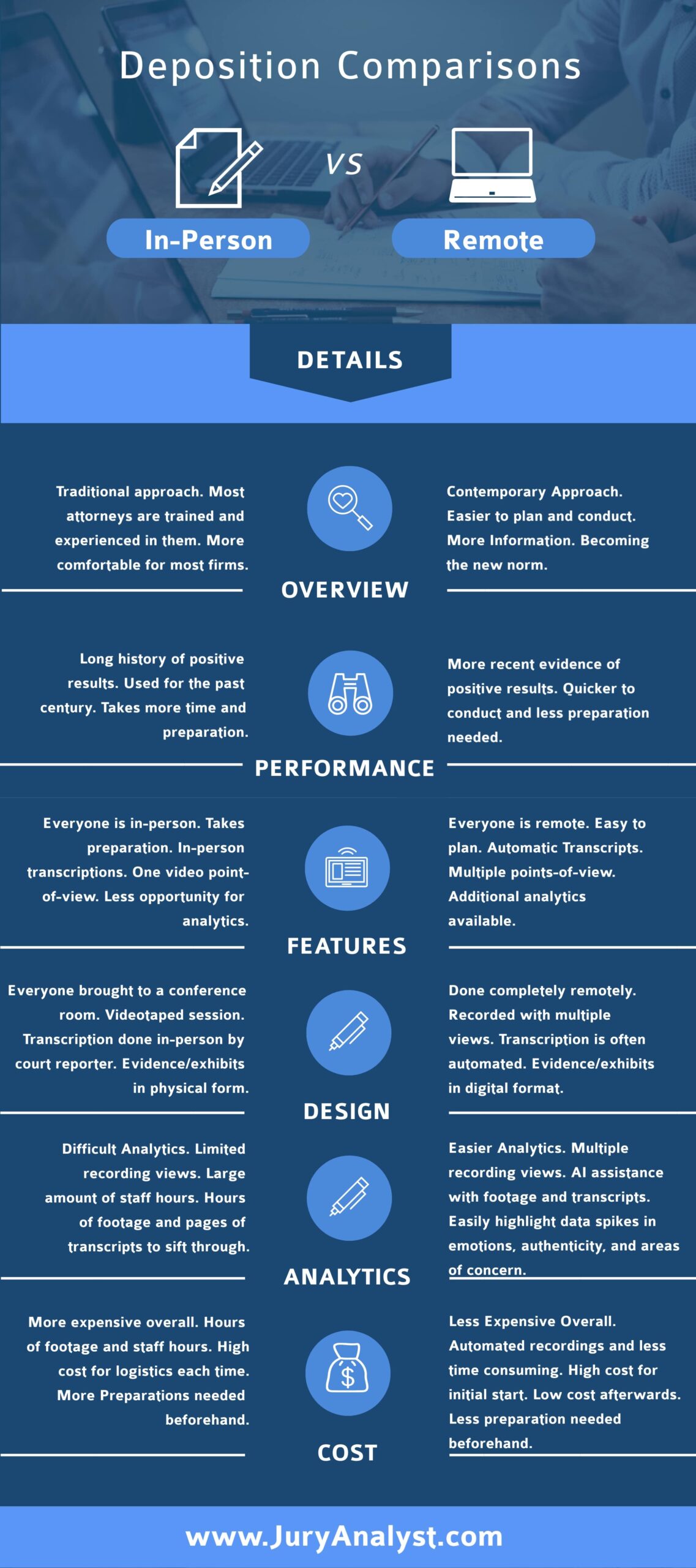
Over the last six months, remote work has become the norm. Many Americans are working from home and doing every aspect of their job from their couch or home office. Even in law, videoconferencing and remote technology have become the new norm in the field. Traditionally, practicing law required a significant amount of face-to-face interaction. Attorneys need to meet with the plaintiffs, opposing counsel, and conduct depositions all in person. However, the COVID-19 (coronavirus) pandemic has changed that. Attorneys now rely on Zoom calls and other video conferencing software to complete these tasks. A prime example is remote depositions.
Remote Depositions
The coronavirus pandemic has forced the adaptation of remote technology in law, which has been commonplace in many other fields for years. Remote depositions are not new, rather they have been viewed as a predilection of more progressive and tech-savvy law firms. Remote depositions involve an attorney deposing an individual via video conferencing software, such as Zoom, while a court reporter is present on the call. The remote deposition requires an understanding of the software used, some practice to make sure everything goes smoothly and is completed adequately, and a level of comfort from the attorney. All of this is to ensure that quality is not lost compared to in-person depositions. Though not fully understood by most firms, remote depositions can be quite beneficial and even more advantageous than in-person depositions if done well.

Benefits of Remote Depositions
Moves Your Case Along
More importantly, now than ever, cases need to keep progressing. COVID-19 has stalled the justice system, but plaintiff attorneys need to be able to keep their cases moving the best they can in preparation for the rapid onslaught of trials when court resumes. Remote depositions are one of the best ways to keep a case churning. With the current health policies in place across the United States, the logistical problems and safety risks involved with in-person depositions make them nearly impossible. Remote depositions easily fix both of these problems.
Provides Safety and Comfort
Face-to-face interactions may never be the same after this pandemic. People are scared. No one wants to talk in close proximity to another person for fear they may have the virus. Many Americans do not want to leave their homes. Fortunately, remote depositions allow the deposed individuals to feel both comfortable and safe in their homes. They do not have to put on a mask and get on a plane or drive through a city. They do not have to show up to a building they have never been in and talk to a number of people they do not know just to answer some questions. Remote depositions may seem like a burden to some attorneys, but to the deposed individuals it is convenient, safe, and comfortable. During these trying times, safety and comfort are key in questioning individuals. The more comfortable they feel, the more honest they will answer questions and will provide you with accurate evidence for your case.
Easy to Use
Many attorneys are worried about being forced to use these more tech-based methods, but don’t be! They are very simple to conduct. You have likely used Zoom for some meetings in the past, it is not much different. The logistics of these depositions are far simpler than in-person depositions. The deponent simply needs a cell phone, since nearly all have high-quality speakers and cameras, and scheduling can be done simply through email invites or phone calls. The software does a lot of the work for you. Many of the court reporting integrations you can find for Zoom will get you a real-time transcription that can be extremely helpful. You can have as many people as you want in the call, including legal assistants and court reporters, without their video being shown to the deponent. You are also provided with multiple recording view options that can show only the person speaking or both the attorney and deponent at the same time. Additionally, there is a “share screen” option which allows you to introduce exhibits with ease. Much of the current video conferencing software lets you upload your documents before the call to be as prepared as possible and more easily introduce the exhibits during the deposition. It really is simple once you get the hang of it. No attorney has to be tech-savvy to be able to run these types of software and at least one member of their team likely knows how to troubleshoot any issues you may experience.
Easy to Practice
Much of the video conferencing software is free and easy to use, but that does not mean it does not require some practice to be effective during remote depositions. It is very easy to use this type of video conferencing software to practice your depositions. It allows the attorneys to become more comfortable with not only the software but the context in which the depositions are being conducted. It is not the same as in-person depositions and it is very important for the attorney to be comfortable and confident with their remote deposition skills.
Is it Secure?
Many people worry about the security problems of Zoom and other video conferencing software. There have been viral videos of people “zoombombing,” meaning they join the video without being invited. However, these are always user-error problems. You can set up a call that is very secure where the link is given only to the deponent and they must enter a specific password to then be allowed into the call by you or your tech support member. Additionally, some attorneys worry about the security of the video and the information presented. That again is fully controlled by the user. You can store all your video and documents in a secure location after the deposition is complete and Zoom (or other software) does not have to retain a copy of any kind.
Provides You More Information
Remote depositions give you even more information than in-person depositions. Many of the common software used for remote depositions have live transcriptions. This allows you to analyze what was said in real-time while also being able to run linguistics and lexicon analytics on the transcript to get an idea of how the deponent is acting and thinking. Once the remote deposition is complete, you get a variety of different video point-of-view options. Some examples are the presenter’s view, which will show only the individual who is talking. This means that when you ask a question it will show your face and when the deponent answers it will show theirs. You can also do a grid view that shows both you and the deponent at the same time, which can be very beneficial in the trial. The split-screen grid view can help jurors put a voice to a face rather than going back and forth between who is talking in the presenter’s view. This can help the jurors see what was really happening during the call and show the non-verbal reactions of both the attorney and deponent during the deposition.
Areas of Improvement for Remote Depositions
Though remote depositions are a robust tool for attorneys, especially in the current health crisis, they do have their limitations and can always be improved.
Different Environment
Much like virtual trials or voir dire, there is a major change in the environment in which these activities are conducted. In remote trials, there is no longer a courtroom filled with attorneys, a judge, and a plaintiff, but instead an empty white room or even their own home office. Remote depositions are no different; the environment has changed. The attorney is not present in-person, potentially removing some of the seriousness of the deposition. It is more difficult to emphasize points and promote the seriousness of the matter. However, this problem can be solved by changing techniques. A different environment does not have to be bad, but it may take some time to find new techniques to get the same results as face-to-face depositions.
Lack of Experience
Attorneys have been trained to do in-person depositions. They have years and even decades of experience doing hundreds of depositions that way. But now, things have changed. Their old tactics may not work in this new context. They may need to alter the way they speak or introduce exhibits. But, these remote depositions can be customized just like in-person depositions. You can choose to stand in front of a whiteboard for your video conference or have a separate camera pointed on a piece of paper you are writing on. There are many different techniques used by attorneys more experienced in these types of depositions that can help attorneys new to remote depositions be more efficient, comfortable, and confident in this new norm.
Ethical Issues
One major problem with remote depositions is the problem of the deponents being coached by counsel. There have even been cases where the deponent’s attorneys will provide them with a script to read that will appear quite obvious in the video recording. Attorneys who are more comfortable and experienced with remote depositions have found clever ways to fix these problems. They have asked the deponents and their counsel to shut off all electronic devices and put them somewhere in view of the screen. Some attorneys have asked deponents to do a full 360-degree rotation of their camera to let the attorney know exactly how their room is set up and who is in the room. There are many other tactics that can be used to ensure this is not going to be a problem in your remote depositions.
Technical Issues
Like all uses of technology in the workplace, there is a chance for technical problems. The camera of the deponent may stop working. The audio may cut out or become muffled. There may be an internet delay on either end. The list is endless. It is important to make sure you have someone who is familiar with the technology and solutions to all these problems. Luckily these can usually be easily fixed and rescheduling a remote deposition is far easier than an in-person deposition.
The Future of Depositions
Though remote depositions are going to become commonplace in law, they may not be the only option. There is a chance that in-person depositions may come back in many jurisdictions. However, it is important to remember that this pandemic may be only one of many that can occur in the future, or it may last much longer than expected. All firms and attorneys need to be prepared for crises like this by conducting at least a portion of their depositions remotely to make sure that if something like this pandemic were to occur again, they will be prepared.
Jury Analyst’s Approach
In conjunction with court reporters, we can provide your team with valuable insights into the deponents and the results of your depositions. We can run facial analytics on the deposition video to give you an idea of the deponent’s immediate reaction to each of the exhibits you introduce and questions you ask. We can also conduct linguistic analytics on the real-time transcripts provided by court reporting companies that can give you valuable insights into the emotions and authenticity portrayed by the deponent during the deposition as well as the personality traits they presented throughout the deposition. We can also provide technical support for the video conferencing software and the results of the remote depositions. Additionally, we can conduct focus groups testing which point-of-view is best for your case, which exhibits and questions should be highlighted, and how a jury would perceive your remote deposition in the trial. Our services can be tailored to each unique case. We are always here to help!
